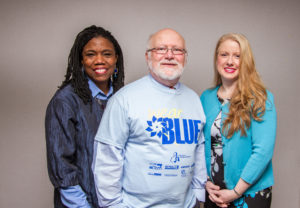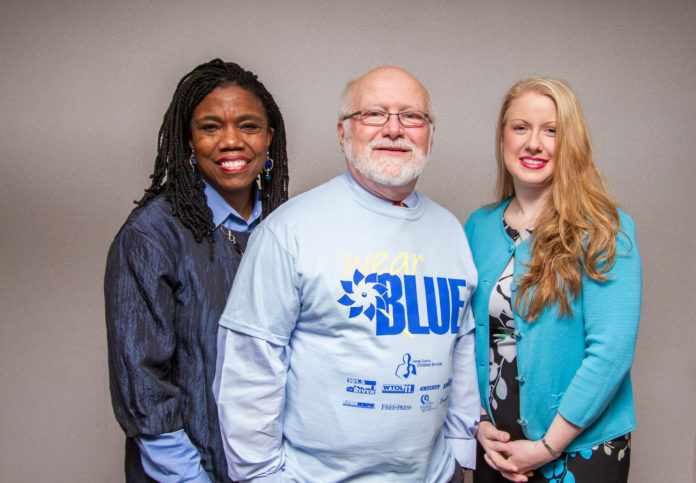April is National Child Abuse Prevention Month and April 8 is Wear Blue Day. The gesture is meant to raise awareness and acknowledgment that it takes a whole community to keep kids from being abused or neglected, said Dean Sparks, executive director of Lucas County Children Services (LCCS).
In 2014, LCCS received 4,271 referrals for suspected child abuse involving 6,419 children. Physical abuse allegations accounted for 51 percent of those reports, followed by neglect (35 percent), sexual abuse (12 percent) and emotional abuse (2 percent).
LCCS substantiated 40 percent of all reports received for physical abuse in 2014. That’s up 7 percent from 2013.

Memorial service
As part of National Child Abuse Prevention Month, LCCS also hosts a memorial service for Lucas County children killed by abuse, neglect or street violence during the past year.
This year’s ceremony, set for 11:30 a.m. April 29 at LCCS, 705 Adams St., will memorialize four children: Kevin Troutman, 2 months, and Delayno Oliver, 2, who both died of traumatic injuries, and Tyler McIntoush, 16, and Carter Coley Jr., 17, who were both shot.
Corporal punishment
One topic LCCS is focusing on this year is discouraging corporal punishment, Sparks said.
“We’re not going to say people can’t use corporal punishment on their kids,�? Sparks said. “[However,] we draw the line between child abuse and discipline.�?
LCCS does not advocate spanking children and believes parents should use other, more effective alternatives to deal with their child’s behavior, Sparks said.
“There’s always been that line between how much is discipline and how much is too much,�? he said. “When does this become child abuse? We need people to think about that when using physical discipline — how much danger there is. For example, if you use a cord to spank a child, it’s probably abuse. You’re risking that line between abuse and negligence.
RELATED: New LCCS grant will help parents work through past trauma
“There’s smacking versus hitting,�? Sparks said. “We have to help people figure it out. To pat on the bottom is a different thing than hauling off and hitting them in the face. You get a smart aleck at 13 and you have to really help people think about what the consequences are.�?
Sparks had his own personal experience with corporal punishment. His father was raised in Kentucky “the old-fashioned way�? and spanked Sparks when he was growing up in Columbus. However, Sparks did not spank his own children, he said.
“It’s not against the law. You’re allowed to spank children. I don’t think it’s the best way to teach things, personally,�? Sparks said. “I never spanked my kids and they all turned out to be responsible adults.�?
Spanking actually teaches about the ways in which adults deal with their frustration, anger and stress, he said. Parents who spank often “put up barriers�? between themselves and their children, he said.
Marian Brannon, strengthening families coordinator with Lucas County Family Council, agreed.
“Corporal punishment is when parents don’t have the skills or nothing has been modeled for them as a way to affect the child’s behavior,�? Brannon said. “A lot of folks are raised with that: ‘This is what my grandmother did.’ But we don’t do anything else your grandmother did so why are you holding on to that? Everything has to evolve.�?
Brannon’s work at Family Council focuses on parents because “children don’t abuse themselves,�? she said. The group’s ACT Raising Safe Kids programming comes into play when parents are abusing their children through discipline, she said.
The programming helps parents identify what violent discipline is and includes a piece on self-reflection to discover in themselves why they are being violent toward their children, Brannon said.
Brannon said she has run into many professionals who say, “I was spanked and I’m OK,�? but “they’ve been through three marriages,�? and have a host of other issues that may affect their children.
Christie Jenkins, CEO of the Family and Child Abuse Prevention Center, focuses on trauma, cognitive therapy and advocacy. In her 20 years working with survivors of abuse, she said she has witnessed some pretty horrific sights concerning violence against children.
“A little boy was beaten with an extension cord. Because of the nature of his injury, his clothes were seared to his wounds,�? Jenkins said. “Many times we as counselors, as teachers, as social workers have suspicions but we really can’t prove it. If you feel that way, it’s important to report it. We don’t have to prove it; we just have to report it.�?
An important aspect of her work getting resources and education to the parents. One way she does this is through the public library. The other part of her job is training people how to protect children.
Adults generally put the responsibility on the child for their own safety, as when telling a child “don’t talk to strangers,�? but her program teaches the parent how to keep children safe.
There are a number of conscious actions parents can take to avoid corporal punishment.
First is simply to make a decision about how you’re going to discipline your kids, he said.
“I’ve always said you will raise your child exactly as you were raised unless you make a conscious effort to do it differently,�? he said.
One way is to use positive reinforcements. You have to teach children how to act properly, and when you catch them doing something the correct way, praise them. What is “absolutely critical�? is leading by example, Sparks said.
Parents can give timeouts to their children or redirect their child’s behavior, Jenkins said. Parents say they don’t have enough time or that they work too much, but Jenkins says five or 10 minutes with a child makes a big difference in their behavior. Play cards or watch a YouTube video together.
“Show you are invested in them,�? she said. “Find out what is behind the behavior. They’re acting out because negative attention is better than none at all. Spend time with your children.�?
Part of the problem is that many parents in today’s society are under great amounts of pressure, Brannon said. They are struggling at work, living in poverty and lack education.
“We don’t talk about [parents] until the child does something. They need support,�? she said.
Family Council’s programing considers five pillars: social connection, resiliency, knowledge of child development, social and emotional competency and concrete support. Brannon works to support parents in each of the categories.
“My whole umbrella is about building supports,�? she said. “[Parents] need resources. They’re on a hamster wheel of trying to get their needs met. … We just really help parents understand there’s other ways to affect behavior. [Abusers] are essentially modeling bullying. And we wonder why we have problems with bullying.�?



